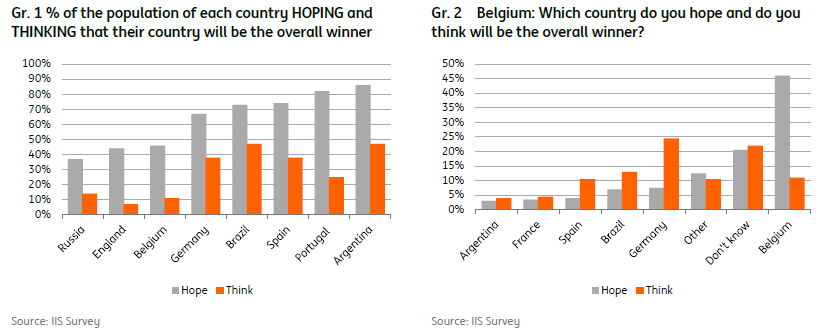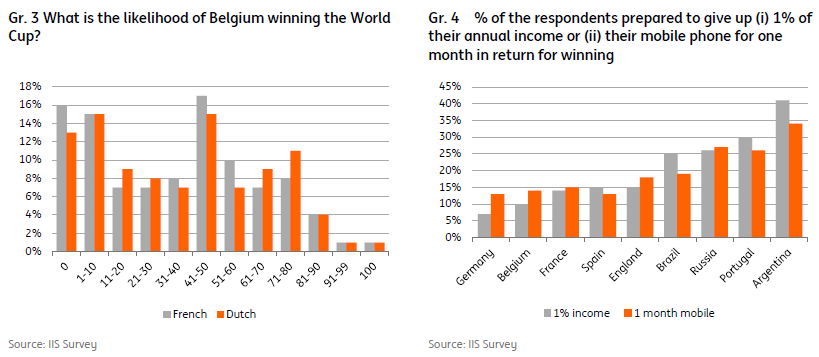World Cup: the supporters are warming up!
Hosted by Russia, football's World Cup is due to kick off shortly. To what extent does this major event change household consumption? What value do supporters place on being the overall winner? These are some of the questions addressed in this special issue of the ING Belgium Economic Newsletter, based on an international survey, not forgetting the big question: who is going to win?
Sporting chauvinism
The first part of our World Cup study showed several criteria that can be used to predict which nation will be the overall winner. Another very simple way is to ask the population which nation has the greatest chance of winning it. However, with this kind of question, patriotism may obviously be a determining factor, which is why we first asked which nation the population of each country hoped would win (Graph 1). Sporting patriotism seems to be greatest in Argentina: 86% of the respondents hope that their nation will win. In Belgium, 46% of the respondents hope that the Red Devils will win it.

Sticking with Belgium, the result is different, of course, if you ask who will win it. In this case, only 11% of the respondents think that Belgium will go all the way. After that, the Belgian respondents hope above all that Germany (8%) and Brazil (7%) will win. A more pragmatic 25% think that Germany will win it, ahead of Brazil (13%) and Spain (11%). Incidentally, this trio of nations comes up in most of the countries.
To narrow down the results in each country, we also asked each respondent for the objective likelihood of their national team being the overall winner. In the case of Belgium (Graph 3), 32% of the respondents say that the likelihood of Belgium winning the World Cup is greater than 50%. Less optimistically, just as many say that the likelihood is zero or no more than 10%… In this respect, the Argentinians, Spanish, Germans and Brazilians are more certain that their national team will be victorious. In these four nations, more than 60% of the respondents say that the likelihood of being the overall winner is greater than 50%.

The value of the title
To measure the population's passion for winning the World Cup, we tried finding out what percentage of the population would be prepared to give up 1% of their annual income in return for winning football's holy grail. Unsurprisingly, the highest proportion of the population responding in favour of this suggestion is to be found in Argentina (41%). In contrast, the percentage is lowest in Germany. These results are substantially similar if you suggest giving up their mobile phone for one month in return for winning.
In fact, the results shown in Graph 4 are fairly similar to the results from four years ago. Russia and Argentina topped the results back then too. Only Portugal did not feature at this level. For Belgium, the results are also fairly comparable: in this year's survey, 10% of the respondents say that they are prepared to give up 1% of their annual salary, which is an almost identical result to the one from four years ago.
How does the consumption behaviour change?
We know that if a major sports competition such as the World Cup has an economic impact, that impact is mainly due to an increase in the supporters’ consumption behaviour. In that respect, the Belgians are very reasonable compared to the other countries. When asked how they would adjust their consumption behaviour (i) in the area of alcoholic beverages and (ii) snacks, (iii) in cafes and other places where the World Cup is shown on a big screen, (iv) in the field of mobile data to view the matches on their tablet or smartphone or (v) when it comes to multimedia devices (television, projector), 80% of Belgians said they would not change their spending pattern. On average, only 8% of respondents said they would spend more on these types of expenditures. That is the lowest score of all countries that were surveyed. By way of comparison, 28% of the Portuguese, 31% of Brazilians and 32% of Argentinians indicate that they would spend more money on these types of expenditures.
Will there be a different result if the Red Devils are successful on the field? We will know the answer in little more than a month!